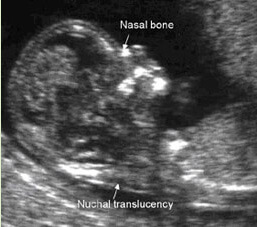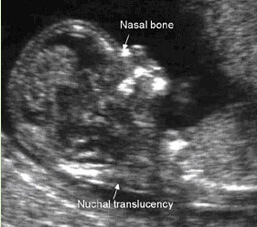

First & Second Trimester Antenatal Risk Assessment
Diagnostic tests such as amniocentesis or chorionic villus sampling are the only way to be certain of chromosome abnormalities. However, these tests are associated with a risk of miscarriage. Fortunately, there are screening tests available to help determine the chance of the fetus having specific chromosomal abnormalities like Trisomy 21 (Down Syndrome), Trisomy 18 (Edward’s Syndrome) and Trisomy 13 (Patau Syndrome). Knowing this, couples can then better decide whether they wish to undergo more invasive diagnostic tests.
First Trimester Screening (FTS)
FTS combines maternal blood testing with an ultrasound evaluation of the fetus. Also known as OSCAR (One-Stop Clinic for Assessment of Risk for Fetal Anomalies), this screening test can help detect possibilities of fetal anomaly, in particular Down Syndrome. This test is performed during the 11th to 14th week of pregnancy. The detection rate for chromosomal abnormalities is 90%.
- The ultrasound scan measures nuchal translucency, which is a collection of fluid under the skin behind the baby’s neck in the first trimester of pregnancy. Babies diagnosed with Down Syndrome tend to have nuchal translucency that is thicker than average. Results from this scan, the blood test and the mother’s age will determine the chances of chromosome abnormality.
- In addition to this, an ultrasound assessment of the nasal bone at 11 to 14 weeks improves the accuracy of screening for Down Syndrome. A thick nuchal translucency and an absent fetal nasal bone are linked to an increased probability that a baby will have Down Syndrome.

Normal nasal bone and nuchal translucency
(Low risk of Down Syndrome)

Normal nasal bone and nuchal translucency
(Low risk of Down Syndrome)
Second Trimester Screening
Maternal serum screening is a blood test conducted between 15 to 20 weeks of pregnancy to aid in the risk assessment for Down Syndrome. The blood test measures the amount of human chorionic gonadotrophin (hCG) and alpha-fetoprotein (AFP) which are produced by the fetus and the placenta. These results are combined with the mother’s age to calculate the chance of having a baby with Down Syndrome.
Non-Invasive Prenatal Testing (NIPT)
Our pregnancy clinic also offers NIPT, which is a new test to screen for genetic conditions, specifically Down Syndrome. There is no risk to the mother and fetus as it involves analyzing a sample of the mother’s blood for cell-free fetal DNA.
- Preparing for Pregnancy
- Antenatal Screening
- Antenatal Risk Assessment
- Birth Plan & Delivery
Click On Each Service To Read More

Website maintained by Activa Media. All rights reserved.
321 Clementi (WE Cinema Mall) Block 321 #01-05, Clementi Ave 3 Singapore 129905
Phone:+65 6873 3383
(Consultation by appointment only. No walk-ins)
Fax:+65 6873 3373
Emergencies Only:+65 6535 8833
(For appointments, please call clinic)
Email:gynaemdclementi@singnet.com.sg
Clinic Operating Hours:
Monday to Friday : 9am – 1pm, 2pm – 7pm
Saturday : 8:30am – 12:30pm
Closed on Sunday & Public Holidays
Website maintained by Activa Media. All rights reserved.